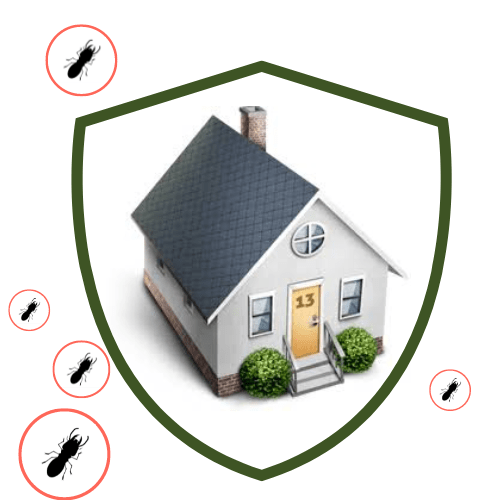Termite Control -Answers for Home Owners
Hey there! Welcome to our guide all about Termite Control. Your home is like your safe place, right? Well, termites can mess that up, but don’t worry – we’ve got answers for you. We’ll help you figure out if there are termites, what to do about it, and how to make sure they don’t come back. Let’s dive into making your home termite-free and cozy!

Q1: How can I tell if my home has a termite infestation?
A: Keep an eye out for signs such as discarded wings, mud tubes, or wood damage. Since termites often remain hidden, scheduling regular inspections by professionals is crucial. Furthermore, early detection and intervention can prevent extensive and costly damage to your home.
Q2: Are there any preventive measures I can take to avoid termite infestations?
A: Yes, ensuring proper ventilation, promptly addressing leaks, utilizing termite-resistant materials, and scheduling regular inspections are essential steps. Additionally, implementing termite barriers and opting for treated wood can serve as effective preventive measures in safeguarding your property against termite infestations.
Q3: Can I handle termite control on my own with store-bought products?
A: While certain products might provide temporary relief, opting for a professional pest control service is advised for lasting termite control. DIY methods may not effectively tackle the entire colony, making professional intervention essential for comprehensive eradication.
Q4: How often should I schedule termite inspections for my home?
A: Annual inspections are generally recommended. However, high-risk areas or older homes may benefit from more frequent inspections. Early detection is key to minimizing damage.
Q5: What is the difference between dry wood and subterranean termites?
A: Dry wood termites infest dry wood, whereas subterranean termites construct nests in soil and travel to their food source. Professional inspection is indispensable for identifying the specific type of termite and prescribing the appropriate treatment method.
Q6: Are termite control treatments safe for pets and children?
A: Most professional treatments are designed to be safe for humans and pets when applied by trained technicians. Always follow the guidelines provided by the pest control service.
Q7: How much does termite control typically cost?
A: Costs vary based on factors like the severity of the infestation, the type of termites, and the treatment method. It’s advisable to get multiple quotes from reputable pest control companies for accurate pricing.
Q8: Does homeowners’ insurance cover termite damage?
A: Typically, homeowners’ insurance does not cover termite damage. Preventative measures and prompt action upon discovery are the best ways to protect your home.
Q9: How long does termite treatment take, and when can I return to my home?
A: Treatment duration varies depending on the method used and the extent of the infestation. Your pest control professional will provide information on timelines and any necessary precautions.
Q10: What steps can I take after termite treatment to prevent future infestations?
A: Regular inspections, addressing moisture issues promptly, maintaining proper ventilation, and using termite-resistant materials during renovations or construction can help prevent future termite problems.
Q11: Can I use vinegar or other household items to get rid of termites on my own?
A: Unfortunately, common household items like vinegar aren’t effective against termites. Professional pest control is recommended for a thorough and lasting solution.
Q12: How do I know if termites have caused structural damage to my home?
A: Look for sagging or damaged wood, buckling paint or wallpaper, and hollow-sounding wood when tapped. Professional inspections are crucial to assess the extent of structural damage accurately.
Q13: Are there natural or eco-friendly options for termite control?
A: Yes, some eco-friendly treatments exist, such as nematodes and orange oil. However, their effectiveness can vary, and professional advice is recommended for the best results.
Q14: Can landscaping choices impact termite infestations around my home?
A: Yes, certain landscaping practices can attract termites. Avoid using wood mulch close to your home and ensure proper drainage to reduce moisture levels, making your property less appealing to termites.
Q15: How long does it take for termites to cause significant damage to a home?
A: Termites work slowly, but the time it takes for significant damage depends on factors like colony size and environmental conditions. Early detection and prompt action are crucial in minimizing potential harm. Regular inspections are key to staying ahead.
